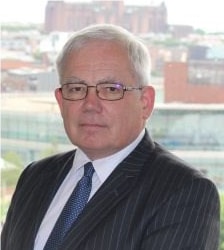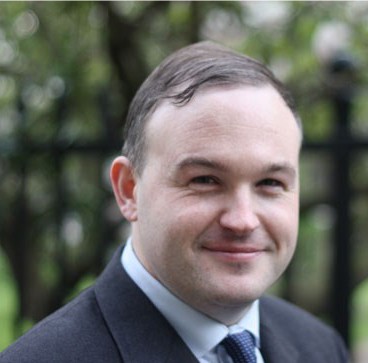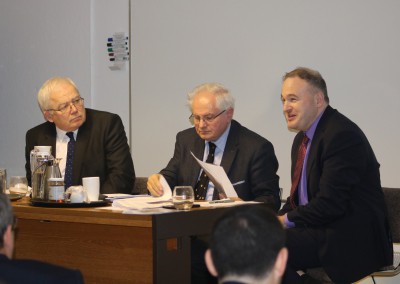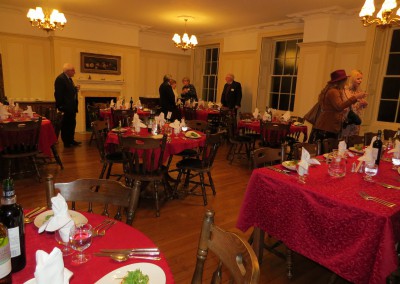Conscience and the moral foundations of human rights
Past conference held on 18th January 2020

About the conference
At the heart of the conference was the case of Lillian Ladele who was disciplined for refusing to conduct civil partnership ceremonies. Her case was heard in the European Court of Human Rights (ECtHR) where the majority found in favour of Islington. However, two judges on the ECtHR dissented, arguing that Ladele was discriminated against because her objections in conscience were not respected. Judge Vincent De Gaetano, Chief Justice Emeritus of Malta, was one of those dissenting judges and our core speaker at the conference.
Proceedings began with a lecture on the nature of conscience by Dr Russell Wilcox. He first defined conscience as the application of knowledge to a particular action with a view to ascertaining its moral character. From there he described what a judgement of conscience involves and what factors limit a conscience. He focused on two limitations – knowledge and action and explained how intrinsic and extrinsic errors could occur based on these limitations. Once the limitations of a conscience were established Dr Wilcox outlined how a bad conscience might be corrected and clarified what a conscience actually binds. Then he addressed the relationship between prudence and conscience and finally emphasised the importance of protecting a conscience.
Next up was associate solicitor Joe Cooper who expanded on the details of the Lillian Ladele case in preparation for Judge Vincent De Gaetano who was the final speaker.
Judge Vincent De Gaetano first explained that the Ladele case may never have actually come before him had it not been added to three other applications that in his view were not connected. He perceived that while two of these cases involved freedom of religion, the other two involved freedom of conscience. Nevertheless, they had been amalgamated into cases that challenged freedom of religion.


Judge Vincent gave us a history of cases that had led up to four cases being heard and the outcome that was achieved. First was the case of Lautsi v Italy followed by the case of Golders v UK, then Tyrer v UK, Soering v UK, Airey v Ireland, Pichon and Sajous v France, Bayatyan v Armenia and finally Jakóbski v. Poland. He then went on to discuss the Eweida v UK case. He explained that Nadia Eweida, an employee of British Airways, had been sent home after refusing to conceal her crucifix. Ms Eweida sued British Airways for loss of earnings during this time and the ECtHR found in favour of her and awarded her compensation.
In the case of Chaplin v UK Shirley Chaplin, a nurse, refused to remove a crucifix and was eventually made redundant. However, the ECtHR did not consider these actions a violation under Article 9 of the European Convention on Human Rights.
Gary McFarlane agreed to counsel same sex couples even though same sex sexual relations were contrary to his religious beliefs. He stated that if any problems arose he would discuss them with his supervisor. He was dismissed for gross misconduct apparently for agreeing to counsel same sex couples without having any intention of doing so. As with Chaplin the ECtHR did not find that there had been a violation of Article 9 or Article 14.
Lillian Ladele was employed by the London Borough of Islington as a registrar of births, deaths and marriages in 2002. When the Civil Partnership Act 2004 came into force Islington extended the role of registrar to include civil partnerships. Initially, Ms Ladele was permitted to make informal arrangements with colleagues to exchange work so that she did not have to conduct civil partnership ceremonies. However this soon changed and Ms Ladele complained of direct and indirect discrimination on grounds of religion or belief and harassment. The ECtHR found that there was no violation of Article 14 taken in conjunction with Article 9. However Judge Vincent disagreed and lodged a dissenting opinion with Judge Vučinić stating that there was in fact a violation. He noted that Ms Ladele had tried to accommodate the rule and no clients had complained. It had been the borough that complained. Judge Vincent believed that had this case been heard independently of the other cases and had been argued that her rights to freedom of conscience had been violated rather than her freedom of religion then there could well have been another outcome to the case.
Another case in which Judge Vincent dissented was Lambert vs France. Following a road traffic accident Vincent Lambert was left in a “chronic vegetative state” requiring artificial nutrition and hydration. While his parents, half brother and sister wanted him to be kept alive with artificial nutrition and hydration, his wife, six other siblings and five doctors wanted it withdrawn to allow him to die. The ECtHR found no violation of Article 2 or Article 8 but Judge Vincent along with five other judges dissented. They argued that it impacted on freedom of conscience.


Questions
All three presentations stimulated a huge plethora of questions not only about the Ladele case but also about the role of a judge, judicial activism which was at its peak in the 1980s and 1990s, who has the upper hand in terms of deeming what is right or wrong – the politicians or the judges, are we truly seeking the truth or simply enacting a discussion about truth? Another question was is there a positive obligation on the state to facilitate the formulation of conscience without trespassing on the values of conscience itself. Another participant wanted to know how to distinguish between freedom of conscience and freedom of religion. After clearly distinguishing between the two Judge Vincent concluded there hadn’t been any cases that really provided the opportunity to make those distinctions clear in law. He would welcome those cases if they came along.
Dinner discussion

At dinner a participant opened the debate with a question on whose consciences were protected by the law and where do you draw the line in protecting them? This stimulated great discussion on the nature of a “right conscience”. One question posed was have we learned the lessons from history of the consequences of banishing conscience from the public square. Can we learn from the past and protect our consciences? This led on to a discussion on the relationship between truth and conscience. Reference was made to Gavin Ashendon, bishop and chaplain to the Queen who became a Catholic on 23rd December 2019 due to following both the truth and his conscience.

Another question was posed how do we preserve a space where we can articulate our own sense of conscience rather than superimposing our views upon others. This led to the discussion on the importance of adopting a set of norms with a robust coherent ontology. Much discussion was had over the question of whether we are living in a pre Christian or post Christian society and reference was made to Tom Holland’s Dominion: the Making of a Western Mind.

Secularism was also discussed and whether or not there is an aggressive secular agenda being pursued that on the one hand is suggesting we are more tolerant as long as we leave our own personal consciences at home. One candidate pointed out that businesses are very capable of accommodating people who didn’t conform to certain norms. For example businesses are making great strides in accommodating people with certain disabilities and they could do the same for people in matters of conscience. It was on this note that this very lively and fascinating discussion was drawn to a close.
Event Speakers

Thomas Teague - Chair
Queen’s Counsel
His Hon Judge Thomas Teague QC was called to the Bar in 1977 and appointed Queen’s Counsel in 2000. In 2006 he was appointed a Circuit Judge. He is assigned to the Northern Circuit and sits at the Queen Elizabeth II Law Courts in Liverpool. In 2016 the Home Secretary appointed him Chairman of the Public Inquiry into the death of Anthony Grainger. The Inquiry’s report was published in July 2019.

Joseph Cooper - Speaker
Associate solicitor
Joseph Cooper is an Associate solicitor at an international law firm in Manchester and practises predominantly in the field of commercial litigation. He graduated from the University of Leeds in 2013 and completed his LPC at the University of Law in Manchester in 2016.

Vincent De Gaetano - Speaker
Judge
Judge Vincent De Gaetano, Section President, European Court of Human Rights 2018-2019, Judge, European Court of Human Rights 2010-2019, Chief Justice Emeritus, Malta.

Russell Wilcox - Speaker
Editor



























